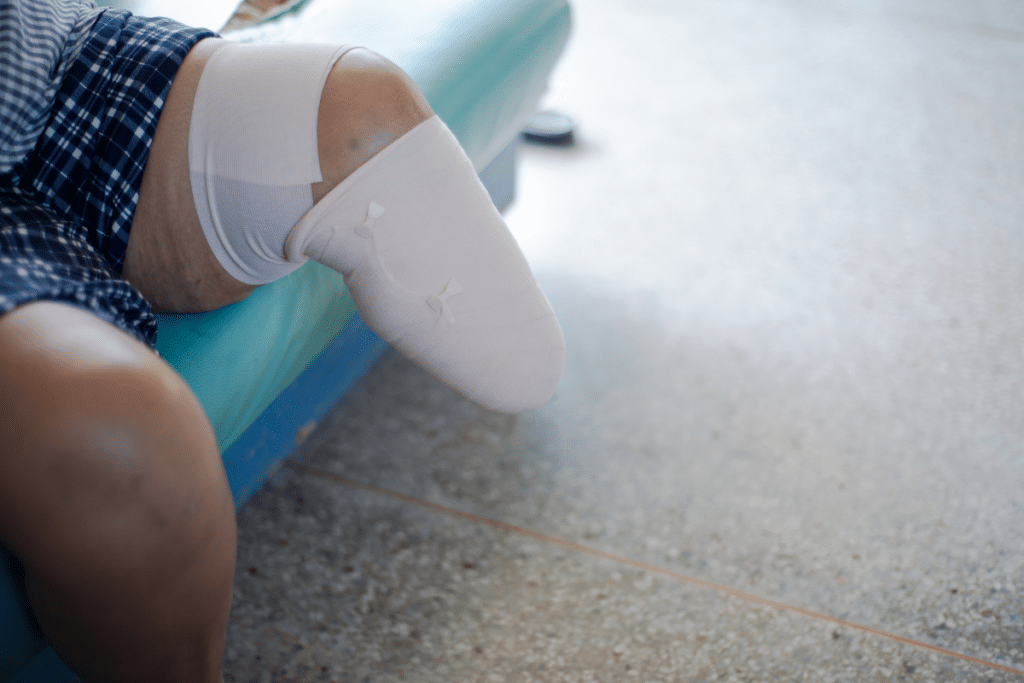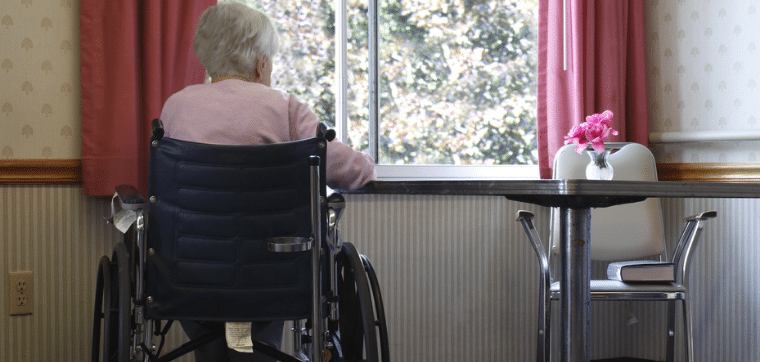Amputations in Nursing Homes
The amputation of a limb frequently results from neglect, abuse, or inadequate care by nursing homes. Illnesses resulting in circulatory problems, such as diabetes, can also lead to unnecessary amputations. If you suspect an amputation was preventable and resulted from poor care, consider speaking with an experienced nursing home amputation attorney at Nursing Homes Abuse to investigate the facility’s liability. An effective amputation care plan is vital to prevent such outcomes.

Home ▸ Nursing Home Injuries ▸ Amputations in Nursing Homes
Limb amputations in nursing homes occur more regularly than you might expect. Even more shocking is that many of these amputations are preventable with proper care and treatment. Nursing home abuse and neglect significantly contribute to the rate of elderly amputations occurring each year.
If your loved one suffered a preventable nursing home amputation, an experienced lawyer can hold the negligent facility accountable and pursue the compensation they deserve. Nursing Homes Abuse can answer any questions you have and put you in contact with a knowledgeable and skilled nursing home attorney in your area. A nursing home lawyer can provide specialized assistance if diabetes was a factor in the amputation.
The Nursing Home Reform Act: Residents' Rights & Legal Protections
The Nursing Home Reform Act was passed in 1987 to address the concerns of nursing home abuse and neglect. The act’s main goal is to ensure nursing home residents receive the proper care to help them maintain their best possible physical and emotional health.
Nursing homes must abide by the act to qualify for Medicaid and Medicare funding. The act establishes specific requirements, such as the services nursing homes must provide. These services include the following:
- Care plans
- Routine checkups
- Social services
- Nursing services
If the nursing home is large enough, the act could require it to retain a full-time social worker. The act also grants residents specific rights, including the rights to:
- Privacy
- Be free from abuse, neglect, and mistreatment
- Have their needs met
- Speak freely
- Be treated with dignity
- Express complaints without fear of retaliation
- Take part in their care plan
- Be free from physical restraints
- Exercise self-determination
- Participate in family and resident groups
The act established a certification process to determine whether a nursing home follows the rules. If a home does not follow the rules, it can face consequences, including losing its provider agreement.
More recently, the Nursing Home Reform Modernization Act of 2021 was introduced in Congress to establish a new ranking system for nursing facilities. Proponents argue that the new system would better ensure nursing homes comply with federal care requirements. Reports suggest the current rating system is flawed and frequently used to misrepresent nursing homes. However, the 2021 bill has failed to gain traction in Congress, and the current rating system remains in place.
Why Amputations Are Common in Nursing Homes
Unfortunately, amputations in nursing homes can arise from abuse and neglect. The following are common causes of amputations in nursing homes:
Chronic illnesses
Certain diseases can result in poor circulation. Diseases such as diabetes and gangrene can increase the risk of amputations, particularly of the feet or legs.
Neglect
While less malicious than abuse, neglect and poor care in a nursing home can have devastating consequences. For instance, inadequately treated infections can progress, ultimately necessitating an amputation. Neglect is particularly an issue for bedridden residents who can develop bedsores if they do not receive proper care, such as frequent repositioning. In extreme cases, bedsores become infected and require amputation.
Falls and injuries
Older nursing home residents may be more prone to falls due to medication side effects, poor vision, and muscle weakness. If a fall results in extensive damage, an amputation could become necessary.
Abuse
Not all nursing home injuries are an act of bad luck. In certain instances, injuries can result from physical abuse. If the injuries are extensive enough, the victim may require amputation.
Common signs of abuse in nursing homes include:
- Bruises, welts, or lacerations
- Broken and fractured bones
- Sprains and dislocations
- Open wounds
- Other signs of injury
- Medication overdoses
- Behavioral changes
- Changes in personality
- Becoming emotionally agitated or upset
- Changes in eating habits and sleeping patterns
- Broken property, such as eyeglasses or jewelry
- Anxiety and depression
- Becoming withdrawn, non-responsive, or non-communicative
- Odd behavior, such as rocking, biting, or sucking
- A report of mistreatment or neglect
If you suspect nursing home abuse, taking these signs seriously and seeking help is important. Related amputations may or may not signal nursing home abuse or neglect, depending on the facts of your claim. An amputation in a nursing home lawyer can help you investigate the nursing home’s liability.

Poor Circulation and Peripheral Vascular Disease
Poor circulation is a big culprit in nursing home amputations, even when residents receive the best care. Diseases such as peripheral vascular disease and diabetes can result in reduced blood flow to the lower extremities, which can cut off the flow of oxygen and nutrients to the tissue in the legs and feet. This leads to cell death, gangrene, and tissue death. When tissues become necrotic, they typically must be amputated.
However, inadequate nursing home care and neglect may exacerbate the risks of amputation from these diseases. Facilities must still provide a reasonable duty of care to prevent limb amputation. Too often, facilities fail to meet their duties.
Amputation Statistics in Elderly Patients Show Most Are Preventable
Amputation statistics among elderly patients are shocking. According to a study from Ohio State University, falls are among the most common causes of upper limb injuries in older patients. These falls significantly increase the risk of amputations.
In the 1980s, approximately half of all lower limb amputations were performed on diabetes patients. Between 2009 and 2019, diabetic hospitalizations doubled due to amputations. Today, diabetes is the greatest factor in amputations. More than 60 percent of non-traumatic lower limb amputations involve a diabetic patient. However, up to 85 percent of these amputations can be avoided with careful disease management.
Nursing Home Amputation FAQs
We understand that the thought of a loved one enduring nursing home amputation is disturbing and can trigger many questions. We have answered common questions on nursing home amputations, including the importance of an amputation care plan. You can also find the answers to more general nursing home abuse questions on our FAQ page.
What To Do After a Nursing Home Amputation?
If your loved one has sustained a nursing home amputation, there are a few things you can do to protect them and safeguard their well-being:
- Understand the cause of the amputation and investigate whether it was necessary or preventable with proper care.
- Ensure they receive proper post-surgery care, a strong rehabilitation plan, and a plan to prevent future amputations. Arrange counseling or therapy if they are suffering psychologically.
- If you suspect nursing home abuse or neglect or believe the amputation was preventable, contact a nursing home neglect attorney.
Was the Amputation Preventable?
Determining whether your loved one’s amputation was preventable is key in these nursing home amputation lawsuits. Factors that may indicate the amputation was preventable include:
- The amputation was the result of a poorly managed health condition.
- An untreated infection or injury caused the amputation.
- A preventable accident occurred in the home, leading to the amputation.
- Abuse, neglect, inadequate care, or an unaddressed health issue contributed to the amputation.
Should I Pursue an Amputation in a Nursing Home Lawsuit?
If you believe a nursing home amputation resulted from abuse, neglect, or poor care, a lawsuit may be in your loved one’s best interest. You could sue a nursing home for negligence if their mistreatment resulted in an amputation. However, each case is unique. Before you commit to a lawsuit, consider scheduling a free case evaluation with an experienced amputation in a nursing home lawyer.
Contact us to arrange a free consultation and have any additional questions answered.
